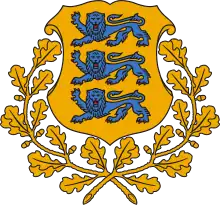 |
|---|

Leading party by municipality.
Municipal elections were held in Estonia on 20 October 2013, with advance voting between 10 and 16 October 2013. A total of 2,951 municipal council seats were up for election in 215 municipalities. The number of councillors had decreased by over 125 compared to the previous elections due to the merging of some municipalities.[1]
The result was a victory for the Estonian Centre Party, which retained its majority in Tallinn by taking 46 of the 79 seats.[2]
Campaign
Alongside the six major parties, 102 independent candidates and 292 citizens' elections coalitions participated in the elections.[3]
Results
| Party | Votes | % | |
|---|---|---|---|
| Estonian Centre Party | 199,876 | 31.96 | |
| Pro Patria and Res Publica Union | 107,780 | 17.24 | |
| Estonian Reform Party | 85,850 | 13.73 | |
| Social Democratic Party | 79,493 | 12.71 | |
| Conservative People's Party of Estonia | 8,337 | 1.33 | |
| Estonian United Left Party | 36 | 0.01 | |
| Citizens' elections coalitions and independents | 143,964 | 23.02 | |
| Total | 625,336 | 100.00 | |
| Valid votes | 625,336 | 99.25 | |
| Invalid/blank votes | 4,714 | 0.75 | |
| Total votes | 630,050 | 100.00 | |
| Registered voters/turnout | 1,086,935 | 57.97 | |
| Source: VVK | |||
References
- ↑ "Kohaliku omavalitsuse volikogu valimised 2013". Vabariigi Valimiskomisjon. Retrieved 1 March 2015.
- ↑ "In Estonian Municipal Elections, Center Party Holds Onto Power in Tallinn, Right-Leaning Parties Prevail in Tartu". ERR. 21 October 2013. Retrieved 1 March 2015.
- ↑ "The ABCs of Estonia's Municipal Elections". ERR. 13 October 2013. Retrieved 1 March 2015.
This article is issued from Wikipedia. The text is licensed under Creative Commons - Attribution - Sharealike. Additional terms may apply for the media files.